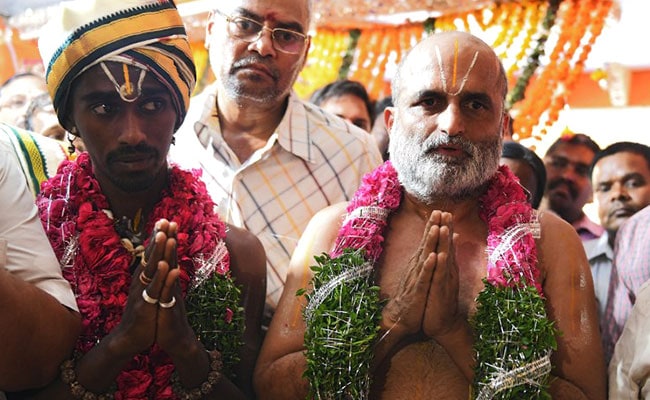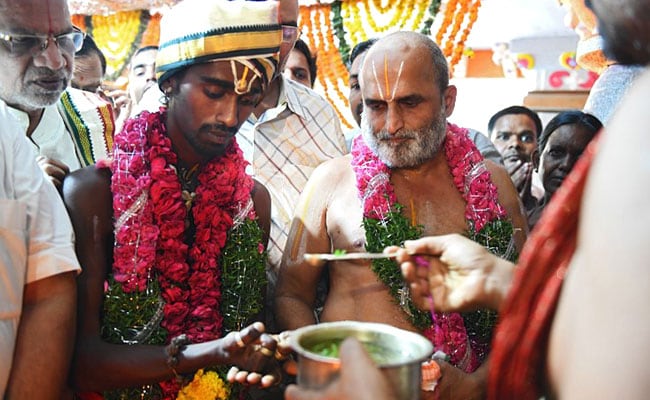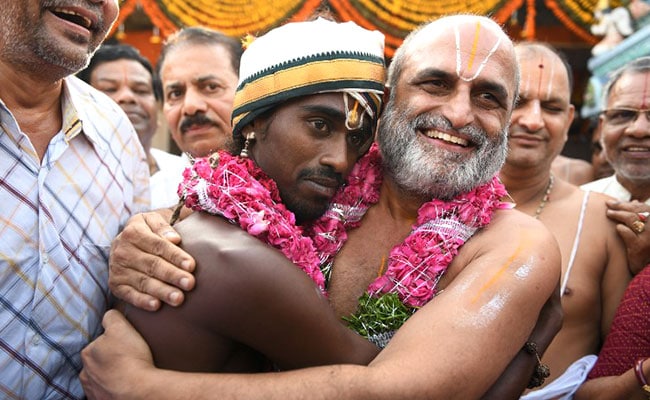
A priest carried a Dalit devotee on his shoulders into a temple in Hyderabad on Monday (AFP)
New Delhi:
A priest in Hyderabad carried a Dalit man on his shoulders into a temple on Monday and hugged him, reenacting a nearly 3,000-year-old ritual that he says holds a strong message in the backdrop of recent violence and discrimination against Dalits.
CS Rangarajan, a priest in Hyderabad's Chilkur Balaji temple, carried Aditya Parasri into the sanctum sanctorum of the Sri Ranganatha temple. The ancient ritual from Tamil Nadu is known as Muni Vahana Seva.
"This is the re-enactment of a 2,700-year old incident. It is being done to re-establish the greatness of Sanatana Dharma and to propagate equality among all sections of the society," the priest told Telangana Today. "This act is enacted as a means to stop the oppression of dalits and promote universal brotherhood among different sections."

In a video posted on Facebook by Chegondi Chandrashekar, the garlanded devotee is seen sitting on the priest's shoulders with his hands joined together. The priest, who is in his fifties, wades through a crowd of people as they film the unique ritual.
The 25-year-old devotee told Deccan Chronicle he hoped the move would lead to a change in mindsets.
"Being a dalit, my family was oppressed and was humiliated when I was denied entry into Lord Hanuman temple in my native Mahbubnagar. This practice is still existent in several temples," he said. "I hope this is just the beginning of change."
Other photos show Mr Parasri performing various rituals, prayers and even getting a warm embrace from the priest.


India saw clashes during a countrywide shutdown on April 2 as Dalit groups protested against a Supreme Court order they felt would weaken a law for their protection against atrocities.
On March 20, the Supreme Court had ruled against the automatic arrest of people accused of attacking or harassing Dalits and other marginalised groups under the Scheduled Castes and Tribes (Prevention of Atrocities) Act, 1989, or the SC/ST Act. The court said its intention was to check fake cases, but Dalit leaders feared the order would leave the communities more vulnerable to attacks.
The centre has appealed to the Supreme Court to review the order.
CS Rangarajan, a priest in Hyderabad's Chilkur Balaji temple, carried Aditya Parasri into the sanctum sanctorum of the Sri Ranganatha temple. The ancient ritual from Tamil Nadu is known as Muni Vahana Seva.
"This is the re-enactment of a 2,700-year old incident. It is being done to re-establish the greatness of Sanatana Dharma and to propagate equality among all sections of the society," the priest told Telangana Today. "This act is enacted as a means to stop the oppression of dalits and promote universal brotherhood among different sections."

CS Rangarajan prays along with Dalit devotee Aditya Parasri after carrying him on his shoulders into the sanctum sanctorum of a temple (AFP)
In a video posted on Facebook by Chegondi Chandrashekar, the garlanded devotee is seen sitting on the priest's shoulders with his hands joined together. The priest, who is in his fifties, wades through a crowd of people as they film the unique ritual.
The 25-year-old devotee told Deccan Chronicle he hoped the move would lead to a change in mindsets.
"Being a dalit, my family was oppressed and was humiliated when I was denied entry into Lord Hanuman temple in my native Mahbubnagar. This practice is still existent in several temples," he said. "I hope this is just the beginning of change."
Other photos show Mr Parasri performing various rituals, prayers and even getting a warm embrace from the priest.

A Hindu priest performs rituals along with a Dalit devotee at the Sri Ranganatha temple in Hyderabad (AFP)

CS Rangarajan hugs Aditya Parasri after carrying him on his shoulders into the sanctum sanctorum of a temple in Hyderabad (AFP)
India saw clashes during a countrywide shutdown on April 2 as Dalit groups protested against a Supreme Court order they felt would weaken a law for their protection against atrocities.
On March 20, the Supreme Court had ruled against the automatic arrest of people accused of attacking or harassing Dalits and other marginalised groups under the Scheduled Castes and Tribes (Prevention of Atrocities) Act, 1989, or the SC/ST Act. The court said its intention was to check fake cases, but Dalit leaders feared the order would leave the communities more vulnerable to attacks.
The centre has appealed to the Supreme Court to review the order.

